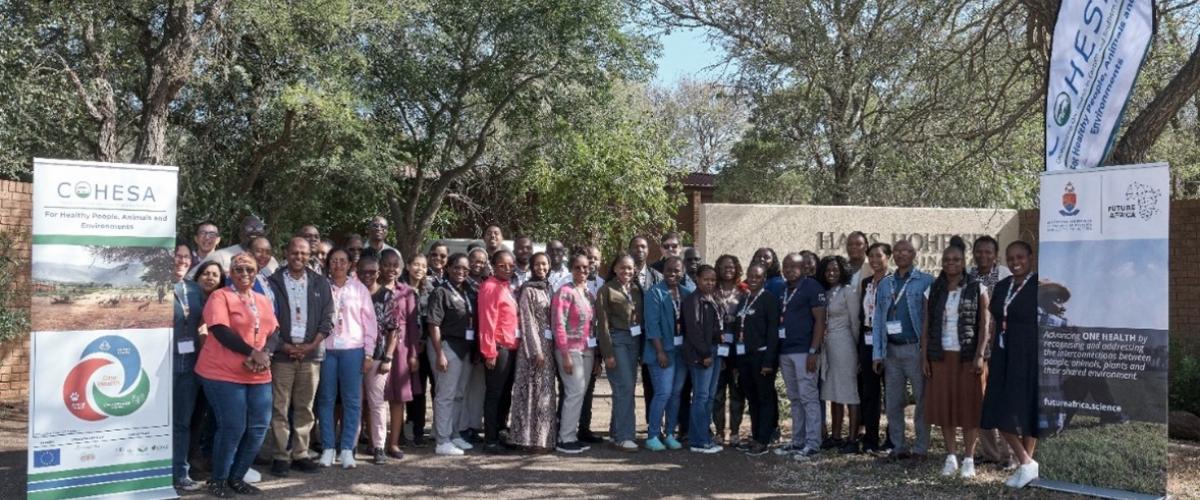
Thirty-three early-career researchers from twelve Eastern and Southern African countries have been equipped with practical skills and knowledge to champion the One Health approach; an integrated way of addressing the interconnected health of people, animals, and the environment.
The five-day training was conducted during a boot camp conducted from 19-23rd May 2025 hosted in and around the Mnisi community, situated in the north-eastern corner of the Bushbuckridge Municipal Area, Mpumalanga Province, South Africa. Participants were drawn from Botswana, Ethiopia, Malawi, Kenya, Mozambique, Namibia, Rwanda, Somalia, Tanzania, Uganda, Zambia, Zimbabwe.
Immersive learning experience
The bootcamp combined lectures, fieldwork, and laboratory sessions, giving participants an opportunity to translate theory into practice. They explored:
- The role of community engagement in sustaining health interventions.
- The value of collaboration between academia, NGOs, and government institutions.
- The importance of disease surveillance and field diagnostics.
- Cross-cutting themes such as communication, coordination, and capacity development for multidisciplinary research.
'The Bootcamp provided exposure to fieldwork for several delegates whose day-to-day responsibilities do not allow them the opportunity to experience application of theoretical One Health concepts and interventions', said University of Pretoria’s John Becker, one of the bootcamp organizers.
Hands-on field and laboratory sessions
Participants trained at multiple sites, including the Hans Hoheisen Wildlife Research Station (HHWRS), the Southern African Wildlife College (SAWC), the Manyeleti Nature Reserve, the Timbavati Foundation, and with South African medical experts.
At the Welverdiend community diptank and Hluvukani animal clinic, they learned about inspection procedures vital for disease surveillance, including foot and mouth disease. Demonstrations included blood sampling and tick drag collection methods, followed by laboratory sessions on tick identification, microscopy, and molecular biology techniques. Additional topics included biobanking, zoonotic diseases, and broader One Health challenges.


Digital tools and applied learning
To strengthen their research capacity, participants were introduced to Epicollect, an open-source platform for data collection, validation, analysis, mapping, and predictive modelling, using real-world projects as case studies.
As part of the practical component, participants developed proposals for One Health interventions targeting diseases such as foot and mouth disease, malaria, and brucellosis. Working with a logical framework and proposal templates, they designed interventions addressing surveillance, prevention, and control strategies.
Building regional One Health capacity
The Bootcamp was jointly organized by the University of Pretoria and the Capacitating One Health in Eastern and Southern Africa (COHESA) project. It targeted participants from the twelve COHESA project countries, with the aim of building a critical mass of young professionals ready to serve as One Health ambassadors in their institutions, communities, and countries.
The Bootcamp provided opportunities for networking and future collaboration as noted by a participant.
'I intend to use the connections made at the Bootcamp to foster collaborative research, and exchange expertise through joint workshops, proposal writing, and knowledge-sharing platforms that strengthen interdisciplinary action on pressing health challenges'.
By equipping young researchers with practical skills, collaborative networks, and a deeper understanding of the One Health approach, COHESA has laid a foundation for the next generation of regional leaders in health research and practice. As these emerging professionals return to their home countries, they carry with them not only new technical expertise but also the shared vision of building healthier, more resilient communities through integrated solutions. Their continued engagement as One Health ambassadors will be key to driving sustainable change across Eastern and Southern Africa.